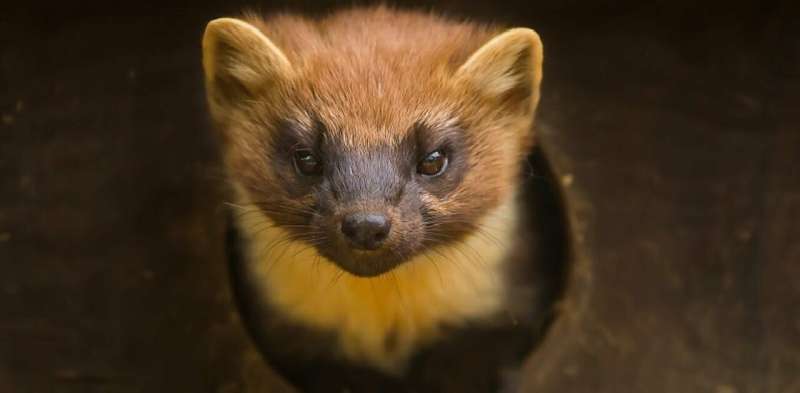The pine marten – cute but cunning. Credit: Karen Bullock/Flickr, CC BY-NC
Pine martens are returning to areas of the UK after an absence of nearly a century. Following releases in mid-Wales during 2015, reintroductions are proposed in north Wales and southern England for 2019.
The pine marten is a small native carnivore that inhabits a range of woodland habitats. It's an excellent climber and often nests within tree cavities. This opportunistic predator has a varied diet including fruit, eggs, songbirds and small mammals.
By the 1920s, pine martens were virtually extinct in the UK after centuries of persecution to protect game birds and poultry. Only a population in north-west Scotland and small numbers in northern Wales and England survived. With UK legal protection, their range has expanded since the 1980s, increasing their encounters with the grey squirrel.
Since George Monbiot penned "how to eradicate grey squirrels without firing a shot" in 2015, the media has courted the charismatic mammal as the saviour for the UK's embattled red squirrels.
The media message is simple: the return of pine martens will herald the decline or even eradication of grey squirrels, which, since their arrival from North America in 1876, have caused regional extinctions of the native red squirrel. That's because pine martens supposedly prefer eating greys, while leaving reds alone.
The optimism around pine martens in the UK originated from research in Ireland and Scotland. In Scotland, scientists studied forests containing pine martens, red squirrels and grey squirrels. The more pine martens they recorded using a woodland area, the more likely they were to find red squirrels and the less likely grey squirrels were to be there. Like earlier Irish studies, this suggested that pine martens suppress grey squirrel populations to the overall benefit of red squirrels.
However, that's not quite the whole story. There's a desire in the media to find heroes and villains in nature which simplifies the situation and obscures the potential impact of a returning predator on British wildlife and livestock. Sadly, ecology and conservation are rarely simple and the restoration of pine martens will not always follow a script.
Provided by The Conversation
This article is republished from The Conversation under a Creative Commons license. Read the original article.![]()























